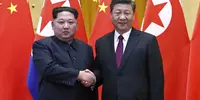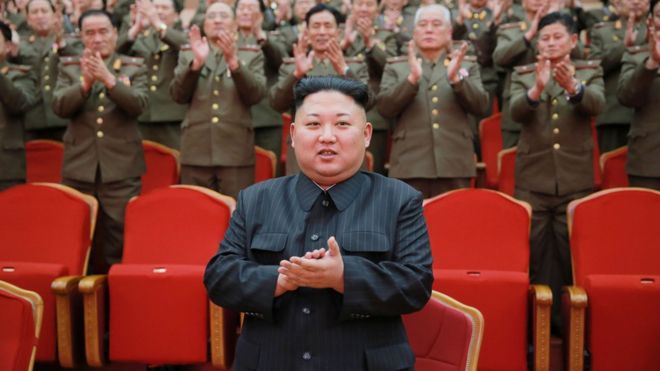One of the oddest things about the current flurry of diplomacy with North Korea is that it has played out like a game of telephone:
South Korean officials dined with Kim Jong Un in Pyongyang and then flew to Washington, D.C., bearing a message that Kim was willing to discuss “denuclearization,” which inspired Donald Trump to agree to an unprecedented summit this spring with the North Korean leader, which motivated the North Korean leader to hop on a train to Beijing this week, which prompted Chinese President Xi Jinping to update Trump on how the visit went, which led the American president to
tweet this morning that he’d heard the meeting “went very well and that KIM looks forward to his meeting with me.”
Through it all, North Korea itself has remained conspicuously silent, at least in public. Hopes for a resolution to the North Korean nuclear crisis have thus largely been pinned on a stream of whispers. As of this writing, the North’s state-run
Korean Central News Agency features news of Kim’s trip to China and dialogue with South Korea, of the issuing of tea-themed postage stamps, and the invention of a fancy new “automatic meteorological observation device,” but no mention of any North Korean commitments to denuclearization.
Kim’s promises this week were conveyed second-hand through
a report from China’s state-run news agency
Xinhua, which includes two direct quotes from Kim Jong Un.
In the first, he stated that his position on his nation’s nuclear-weapons program is in line with that of his father and grandfather: “It is our consistent stand to be committed to denuclearization on the peninsula, in accordance with the will of late President Kim Il Sung and late General Secretary Kim Jong Il.
” In the second, he declared that the “issue of denuclearization of the Korean peninsula can be resolved, if South Korea and the United States respond to our efforts with goodwill, create an atmosphere of peace and stability while taking progressive and synchronous measures for the realization of peace.”
For a guided reading of Kim’s rare public remarks, I turned to Sue Mi Terry, a former Korea analyst at the CIA who is now a senior fellow at the Center for Strategic and International Studies. She said it’s significant that Kim spoke not of removing nuclear weapons from
North Korea, but rather of the “denuclearization of the Korean peninsula,” as a whole. That formulation by the Kim government is “not new,”
Terry told me, and has been accompanied in the past with demands for measures to preserve the regime’s security such as the signing of a peace treaty to finally end the Korean War, the withdrawal of U.S. troops from South Korea, and the end of the U.S.-South Korean military alliance, which in turn would terminate the protection the United States extends to South Korea through its nuclear weapons. Hence, talk of a nuclear-free
peninsula despite the fact that South Korea doesn’t have nuclear weapons. (In this respect, Kim was right to assert that he was simply echoing the policies of his father, who was also
quoted by Chinese media as committing to the denuclearization of the peninsula even as he
persisted in developing the nation’s nuclear-weapons arsenal.)
While it’s notable that Kim didn’t specifically reference security guarantees during his trip to Beijing, Terry said she’d need to see more statements from North Korea, and not just a one-off quote filtered through the censored Chinese press, to conclude that t
he North is now willing to trade away its nuclear program for anything less than the United States abandoning South Korea.
Terry interpreted Kim’s
call for South Korea and the United States to exhibit “goodwill,” establish an “atmosphere of peace,” and take “synchronous measures” a
s a suggestion that he would only move towards denuclearization in response to concessions from both South Korea and the United States—
specifically, relief from the severe international sanctions that the Trump administration has imposed on North Korea.
“There’s a lot there” and none of it is particularly “revelatory,” Terry said. It’s not “North Korea is willing to give up its nuclear-weapons program.” Instead, it’s hedged language that the North can always retreat from. North Korea has shifted tactics in pausing its nuclear and missile testing and agreeing to direct nuclear talks with the United States, perhaps because U.S. economic pressure and threats of military force “spooked” Kim and made him scramble to “buy time,” Terry explained. But there aren’t strong signs yet of a strategic shift.



